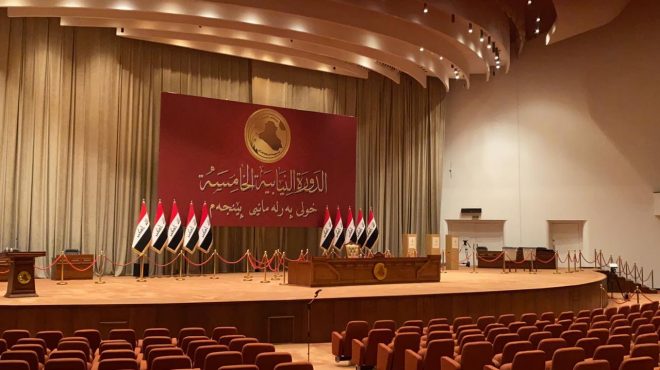The Elderly member, Mahmoud al-Mashhadani, commenced the first session of newly elected Iraqi Parliament earlier today, Sunday.
The session was supposed to start at 11am Baghdad time but has been postponed as politicians are engaged in closed-door meetings and backroom deals.
Traditionally, the first parliamentary session would be tasked with electing a speaker of the parliament and his two deputies. Yet, according to the agenda released by the Council of Representatives, Sunday’s session would only include “nominations of the Speaker and two Deputies”, suggesting a potential non-confirmation on who the speaker would be.
The session, according to analysts, will be anything but smooth: no political party has snatched enough support to be able to single-handedly sway where Iraqi politics in the next four years are heading.
The early elections – which saw the lowest voter turnout rate since the political system was established following the United States-led invasion in 2003, with just 44 percent – pushed Muqtada al-Sadr, a top Shia leader whose politics were built on his staunch rejection of any foreign presence in Iraq, to a sweeping win with 73 out of the 329 seats.
In the three months leading up to the first parliamentary session, Iraq’s political landscape was dominated by meeting after meeting between different parties trying to form a government that would advance their respective interests, interspersed with constant background claims of fraud and threats to boycott the entire election results.
The dust generally settled after the Iraqi Federal Supreme Court ratified the final results of the election in late December last year, with only a few changes from the preliminary results, even though the remaining tensions over the election results could for months still affect the coming government formation.
Al-Sadr, who won the biggest share in part because of his carefully calibrated campaign strategy to use the new electoral law to his advantage, has been vehemently pushing for a majority government that would essentially place tbe Coordination Framework, a consortium of Shiite forces opposing the election results, to the opposite side.
“I see that the first thing that needs to be done for the future for the country is a national majority government,” al-Sadr said in a statement soon after the election results were certified.
The phrase “neither Eastern nor Western” initially championed by him after the preliminary results were released, was tossed around frequently in his political narrative, rhetorically rejecting foreign influence and hoping to establish a majority government. But that has yet to be translated into concrete terms in the government formation process.
The Coordination Framework, consisting of Nouri Al-Maliki’s State of Law, Hadi al-Ameri’s al-Fatah, and their allies, remains unwilling to ship the next government to a Sadrist-led majority government and is continuing to push for a consensus government.
In this painstakingly complex negotiation process, nearly every meeting imaginable was played out. Meetings also happened across the country, from Baghdad to Najaf to Erbil. Yet despite the seemingly endless rounds of discussions between political parties, no crystal agreement was reached.
 Alghadeer TV Alghadeer TV
Alghadeer TV Alghadeer TV

